FedEx announced this week it is extending peak surcharges beyond the holiday season, while lowering them from higher holiday levels, citing the expectation of ongoing heavy volume and associated costs, although some observers question that rationale amid strong financial results.
FedEx just reported GAAP net income more than doubling in Q2 to $1.23 billion or $4.55 per share, ahead of a consensus of $4.01 per share, while revenue increased 19% to $20.6 billion.
The major carrier said the changes will be in place “until further notice” and called them “peak” not “temporary,” signaling a longer-term effect. They cover domestic air and ground and international ground services.
This wording prompted some to wonder if they’re not the new level being set by FedEx in the COVID-19 era, while also expecting UPS to follow suit. The heaviest seasonal charges, instituted beginning Oct. 5, will continue until Jan. 17.
“I thought the extending of surcharges ‘until further notice’ was interesting,” said Matthew Hertz of Second Marathon. “That sounds Latin for “forever.’ No sense in reverting back if shippers are going to pay it. The pricing power of a duopoly unfortunately comes at the expense of small businesses.”
“I would expect UPS to follow suit with a similar announcement soon,” said Nate Skiver, founder of consulting firm LPF Spend Management. “It is reasonable to think that other carriers which also implemented peak surcharges in 2020 will follow FedEx’s and UPS’s lead with some form of continued surcharges.”
Even regional parcel carriers such as LSO, Lasership and OnTrac, and the U.S. Postal Service, instituted package surcharges for the first time in an extraordinary 2020, although generally lower than the duopoly.
As of Jan. 18, FedEx will charge $30 for oversized shipments, down from the current $52.50 and in line with what it announced last summer. SmartPost shipments will be hit with a 75 cent per item surcharge on that date, down from $1 currently but higher than the 40-cent rate from last summer. And packages requiring extra handling will be reduced from $4.90 to $3.
“The impact of the virus continues to generate a surge in volume, and we are experiencing extremely high demand for capacity and increased operating costs across our network this holiday peak season,” FedEx said in announcing the extended surcharges. “We anticipate volume to continue to surge into the new year.”
Smaller ecommerce shippers have come to rely on SmartPost – and UPS’s version, SurePost – as economy options to standard ground shipping, so FedEx’s extension will prove especially painful for many of them. Last year, FedEx began diverting most of its SmartPost volume into its own ground network instead of inducting it into the U.S. Parcel Service, to economize through route density.
Hertz called the SmartPost surcharge extension “significant” for SMB shippers.
“I don’t know any shippers who have been able to negotiate a discount on that amount, so for many it can be a 10% to 15% additional cost,” he said. “That’s a huge impact on emerging businesses, many of which are using SmartPost as their primary ecommerce shipper and a more economical service.”
Satish Jindel, president of ShipMatrix, said he thought both UPS and FedEx should have announced a 6.9% general rate increase (GRI) for 2021, instead of the standard 4.9%, and the surcharge extensions are a way to make up for that lost revenue opportunity. This view may not necessarily align with shippers themselves.
“A 2% higher increase is small dollars for small shippers as they do not spend much, and large shippers ship under contract rates anyway,” Jindel said.
Jerry Hempstead of Hempstead Consulting said the SmartPost fee on packages 10 lbs. and under in particular is “very painful” especially for small shippers lacking volume leverage, and a huge increase from 2020.
“Everyone is flush with packages right now at the carriers, and they are all patting themselves on the back with how smart they are, but that may end up being a big mistake in the long run,” Hempstead said. “From the FedEx (earnings) call they are predicting this run up of packages to last 18 months.”

